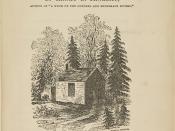The German author J.W. Goethe stated that ÃÂClassicism is health, Romanticism is disease.ÃÂ I disagree with this statement; I donÃÂt think that Romanticism should be classified as a disease at all. In fact, many Romantic authors and poets wrote about nature in their works, which is inextricably linked to health and vitality. Romanticism is not a disease because Romantic authors emphasized the restorative qualities of nature in their works.
A prime example of this is Henry ThoreauÃÂs ÃÂWalden.ÃÂ In Walden, Thoreau escapes from the city and goes out into the woods, forsaking the modern. Nature was his only companion during this time period, and he absorbs it and becomes one with it. This is evidently shown in this quote "Yet I experienced sometimes that the most sweet and tender, the most innocent and encouraging society may be found in any natural object, even for the poor misanthrope and most melancholy man.
There can be no very black melancholy to him who lives in the midst of Nature and has his senses stillÃÂ nothing can rightly compel a simple and brave man to a vulgar sadnessÃÂ.(Solitude p. 1704). Here, Thoreau proves the vitality of Romantic writing, by representing sadness as a disease. He speaks about how this ÃÂdiseaseÃÂ can be cured by turning to nature and its solitude; he says that even the poorest man can find solace in nature and become happy. He shows that nature is the ultimate driving force behind people and their emotions.
Another good example is Philip Freneau. Freneau refers to nature frequently in his poem The Indian Burying Ground. In this poem, he talks about another form of diseaseÃÂdeath. Most people see death in a negative light, but Freneau portrays it in a good way. He says that after death, you still stay active...


